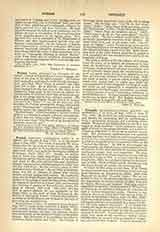

Fouard, CONSTANT, ecclesiastical writer; b. at Elbeuf, near Rouen, August 6, 1837; d. at his native place, December 3, 1903. The whole of his early life was a preparation for the work on which his fame rests. He studied the classics at Boisguillaume, philosophy at Issy (1855-1857), and made his theological studies at St-Sulpice, Paris (1857-61). Among his professors at Paris were Abbe John Hogan, who remained throughout life the inspirer and mentor of his studies, and Abbe Le Hir, who initiated him and his fellow-disciple Vigouroux into Biblical science, to which they devoted their lives. He was ordained priest in 1861 and entered the “Solitude”, the novitiate of the Sulpicians, but left on account of illness after several months without joining their society. He taught for some time at Boisguillaume, then pursued the study of classics at the college of Saint Barbara, Paris, obtained the degree of Licentiate in Letters, 1867, and resumed the teaching of classics at Boisguillaume, taking the class of rhetoric, 1867-1876. His piety drawing him to sacred sciences, he was appointed by the State (1876) to the chair of Holy Scripture in the faculty of theology at Rouen; he continued, however, to reside at Boisguillaume and to share in the duty of governing the student-body.
Honors came to him: he was made doctor of theology (1877), canon of the cathedral of Rouen (1884), and member of the Biblical Commission (1903). His ecclesiastical science, his piety, his spiritual wisdom were continually at the service of religion in his native diocese. For the benefit of his studies he travelled in Palestine, Syria, Greece, and Italy. The Faculty of Theology being suppressed about 1884, his teaching ceased. His writings are: “La Vie de N-S Jesus-Christ” (1880); “Saint Pierre et les premieres annees du Christianisme” (1886); “Saint Paul, ses Missions” (1892); “Saint Paul, ses dernieres annees” (1897); “Saint Jean et la fin de Page apostolique” (posthumous, 1904). The dates witness, incidentally, to the extremely painstaking character of his labors. All these books form part of one grand work, “Les Origines de l’Eglise”, which Fouard wrote as an answer to the presentation of the same subject by Renan, who like himself had been a pupil of Le Hir. Each successive book of the Abbe Fouard immediately gained a wide popularity and was translated into nearly all the languages of Europe.
His work is esteemed for the interest of its narratives, the purity of its diction, its correctness in doctrine, its conservative but not reactionary critical viewpoint, its breadth and accuracy of erudition, and for its evidently sincere piety, the manifestation of a good and gentle spirit, loving God, delighting in nature, and earnestly desiring to do good to men. With one touch of genius, or greater depth of feeling (gifts which were denied him), he might have fused the various elements of his writings into a truly great work. His works are not remarkable in originality of view or acuteness of critical insight, but present, as a whole, a faithful picture of early Christianity, satisfying to the Christian heart. Perhaps his most esteemed books are the two on Saint Paul. The English translation of his writings is exceptionally well done.
JOHN F. FENLON


